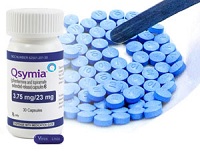Struggling Vivus ($VVUS) is short on cash, and it's got a pricey cardiovascular outcomes trial looming in its future. Its fix? Pare down costs once again--or, in the words of RBC Capital Markets analyst Simos Simeonidis, "amputate a limb so that the patient may live."
In this case, that limb is half the company's sales force for struggling obesity therapy Qsymia. It'll shrink from 100 reps to just 50--and Vivus will be "streamlining" the staff at its California headquarters, too. It's the second straight quarter its rep tally has dwindled; in March, Vivus reduced its army from 150 to 100 and announced plans to beef up its digital media projects to help fill the gap.
The hope, CEO Seth Fischer said in a statement, is that the restructuring will help the company achieve positive--or at least neutral--operating cash flows by the end of the next year. For the second quarter, the company recorded a loss of 48 cents per share--much wider than last year's 25 cents per share and the 24 cents per share Wall Street predicted.
 The $23 million in revenue Vivus posted isn't quite getting it done for the company either, especially with a postmarketing requirement for obesity drug Qsymia on the horizon. It'll need to be wrapped up by the end of 2017, with a trial report due by the end of the following year, Simeonidis wrote in a note to clients--and it'll bear a $200 million to $250 million price tag.
The $23 million in revenue Vivus posted isn't quite getting it done for the company either, especially with a postmarketing requirement for obesity drug Qsymia on the horizon. It'll need to be wrapped up by the end of 2017, with a trial report due by the end of the following year, Simeonidis wrote in a note to clients--and it'll bear a $200 million to $250 million price tag.
In the meantime, the drugmaker is working to overhaul the trial design to cut down the price while fulfilling its obligations. "We are committed to involving the FDA in reviewing alternative proposals that will satisfy the existing requirements," Fischer said.
But the way Simeonidis sees it, what Vivus really needs is a marketing partner for its weight-loss drug--maybe now more so than ever. Industry watchers have criticized Vivus for years now over its decision to roll out Qsymia solo--and in 2013, the move spurred a proxy war that ended in the ouster of its chief exec and more than half its board. And since Qsymia's launch, competitors from Arena ($ARNA) and Orexigen ($OREX) have hit the scene--and those companies boast partnerships with Eisai and Takeda, respectively.
"Promoting a drug with 50-100 sales reps in an arena where the battle is being fought with more than 1,800 reps has clearly not worked out well for Vivus," Simeonidis wrote.
- read Vivus' release
Special Reports: Limited attention span? Focus on these market shake-ups in 2015 | 10 top drug launch disasters